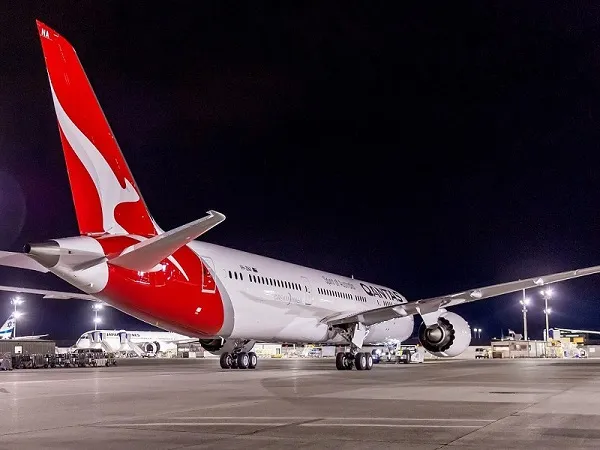
Qantas not cancelling 787 options
Feb 06, 2018

Qantas has decided not to cancel its options for Boeing 787 aircraft, reflecting its commitment to expanding its long-haul fleet. The airline views the Dreamliner as a crucial part of its future operations, particularly for international routes. By maintaining these options, Qantas aims to enhance its capacity and improve fuel efficiency while responding to growing travel demand. This decision aligns with the airline's strategy to modernize its fleet and optimize its network. As air travel recovers, Qantas remains focused on ensuring it has the right aircraft to meet customer needs and support its long-term growth plans.
In a recent announcement, Qantas Airways has confirmed that it will not be cancelling its options for the Boeing 787 Dreamliner, a decision that has significant implications for the airline's future fleet strategy. The news comes amidst ongoing discussions about the global aviation market's recovery and the demand for long-haul travel. As Qantas continues to navigate these challenges, the retention of the 787 options highlights its commitment to maintaining a modern and efficient fleet.
Why Qantas is Retaining 787 Options
One of the primary reasons Qantas is holding onto its Boeing 787 options is the aircraft's fuel efficiency. The 787 Dreamliner is known for its advanced technology, which contributes to lower fuel consumption compared to older models. With rising fuel prices and a growing emphasis on sustainability, having a fleet that includes the 787 is crucial for Qantas.
The Importance of Fleet Modernization
Fleet modernization is a strategic priority for airlines around the world. Qantas understands that maintaining a competitive edge requires investing in newer, more efficient aircraft. The 787 is designed with passenger comfort in mind, featuring larger windows, improved air quality, and quieter engines. These advantages not only enhance the travel experience for customers but also help airlines reduce operational costs.
Market Demand for Long-Haul Travel
The demand for long-haul travel is gradually rebounding, and Qantas is positioning itself to take advantage of this trend. The airline has been expanding its international routes and enhancing its service offerings. The Boeing 787, with its range capabilities, is ideal for long-haul flights, allowing Qantas to connect more destinations while keeping operational costs in check.
Financial Considerations
From a financial perspective, retaining the 787 options can be seen as a strategic move. Qantas has faced financial challenges in the past, and the ability to adapt to changing market conditions is vital. By not cancelling its 787 options, Qantas is signaling to stakeholders that it is confident in its recovery and growth prospects. The decision also reflects a cautious approach to fleet planning, ensuring that the airline is prepared for future demand.
Comparative Analysis of Aircraft Options
To better understand the advantages of the Boeing 787, it is helpful to compare it with other aircraft in the same category. Below is a table outlining key specifications and benefits of the Boeing 787 compared to its competitors:
| Aircraft | Range (miles) | Fuel Efficiency (liters/100 km) | Passenger Capacity |
|---|---|---|---|
| Boeing 787 | 7,530 | 3.0 | 242-330 |
| Boeing 777 | 8,555 | 3.5 | 317-396 |
| A330-900 | 7,200 | 3.2 | 260-300 |
This comparison highlights the Boeing 787's competitive range and fuel efficiency, making it an excellent choice for airlines like Qantas that prioritize cost-effectiveness and passenger comfort.
Future of Qantas and the 787 Dreamliner
Looking ahead, Qantas’s decision to retain its options for the Boeing 787 positions the airline for a robust recovery. As travel restrictions ease and consumer confidence grows, the demand for air travel is expected to surge. Qantas is preparing to meet this demand with a fleet that combines reliability and efficiency.
Furthermore, the airline's commitment to sustainability aligns with global aviation trends. As environmental concerns become more pressing, airlines are under increasing pressure to reduce their carbon footprint. The Boeing 787's lower emissions make it a crucial element in Qantas's strategy to minimize its environmental impact while still providing exceptional service.
Conclusion
In summary, Qantas's decision not to cancel its options for the Boeing 787 reflects a strategic approach to fleet management in an evolving aviation landscape. The airline recognizes the importance of investing in modern, efficient aircraft that can meet the demands of today and tomorrow. With the 787 Dreamliner in its sights, Qantas is not only preparing for recovery but also reinforcing its commitment to sustainability and customer satisfaction.
As Qantas continues to navigate the complexities of the aviation market, the retention of the 787 options will undoubtedly play a pivotal role in shaping the airline's future. By prioritizing fleet modernization and sustainability, Qantas is set to emerge stronger and more competitive in the years to come.
Related Articles

Explore Thailand: The Best Islands to Visit for Paradise, Adventure, and Relaxation

The Ultimate Guide to the Best Islands in Thailand for Your Next Getaway

Do babies need passports? How to get a passport for a newborn

How to get a U.S. passport fast: here’s how to expedite the process

What is Mobile Passport Control: 5 reasons why you should use it

SENTRI vs. Global Entry: A detailed guide

Do you need a passport to go to the Bahamas? Let’s find out

Do you need a passport to go to Mexico? A detailed guide

Do you need a passport to go to Canada? We got the answer

Do You Need a Passport for a Cruise: An Essential Travel Guide

Booster Seat Requirements: All the Rules to Follow in Your Rental Car

What Are the World’s Most Powerful Passports, and How Does Yours Rank?

How to Take a Passport Photo at Home: A Helpful Guide

You've got to have heart! Southwest's new livery

Your opinion: Should water be free on low cost carriers?

Young women bolder than guys as solo travellers
